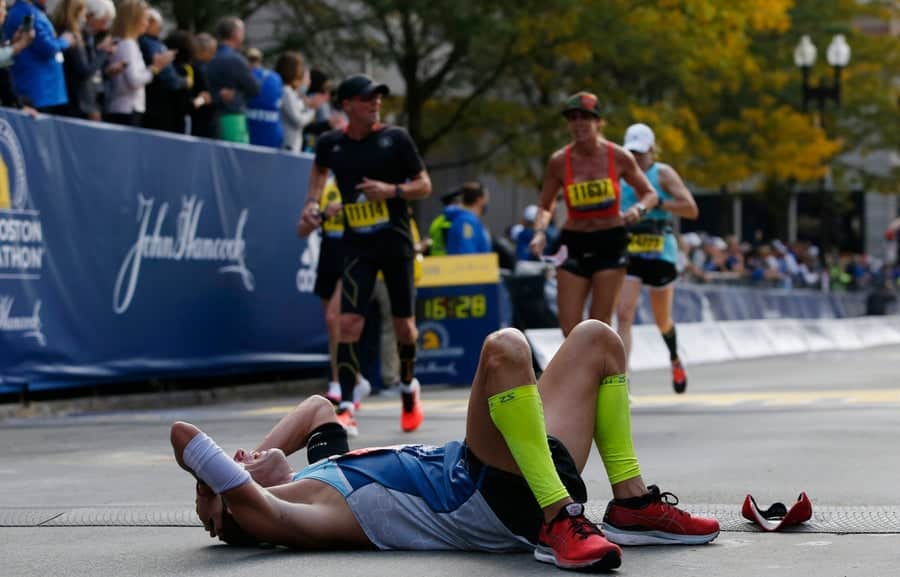Main Problems
In sports, it can be difficult to distinguish between extreme fatigue and a pathological condition. The goal in any competition is to give it your all.If you have enough energy to run to get a free massage in the finishing zone after completing a race, it means that you didn't give your maximum effort. You could have pushed yourself harder and mobilized all your resources.On the other hand, there are times when you have to endure to achieve the desired outcome. The body somehow manages to find a new source of energy, even though it may seem like you've used up all your resources miles ago. However, after crossing the finish line and taking a deep breath, the condition can deteriorate abruptly.Let's first identify the most common complaints of runners in this situation.
1. Nausea and vomiting
Running puts a lot of stress on the digestive system, making it a very common symptom. The issue is not only linked to the increase in blood circulation required to provide oxygen to the muscles but also because during long distances, runners have to eat while on the go.Sports gels, bananas, and salty nuts mixed with cola and isotonic drinks create a chaotic concoction in the stomach. It's not surprising that after consuming such a menu, runners experience stomach discomfort.Related: 35 Common Running Mistakes and How to Avoid Them2. Headache
A severe headache can be associated not only with general fatigue but also with more serious issues. It may be caused by the exacerbation of chronic illnesses, as well as both high and low blood pressure. This latter option is typically more common in individuals with vascular issues and dystonia.3. Dizziness, darkening of the eyes
These symptoms may be due to temporary factors such as dehydration, high stress, or low blood sugar levels. Dealing with these problems is simple - just take a deep breath and have a cup of sweet tea.However, if you have a history of cerebral atherosclerosis or high intracranial pressure, it's crucial to seek medical assistance right away. Otherwise, discomfort after a race can worsen chronic conditions and lead to more serious consequences.4. Muscle cramps
Runners usually experience cramps when it's hot outside. During summer, we not only lose water from excessive sweating, but also the stores of electrolytes such as sodium, magnesium, and potassium.When combined with physical activity, the lack of minerals can lead to involuntary muscle contractions.This is not the only cause of muscle cramps, but it is a common one. To alleviate the discomfort, you can gently stretch the affected muscle and replenish your salt levels. For instance, drinking mineral water is a good option.5. Chest pain
Never ignore chest pain, even if you don't have a history of cardiovascular diseases. Instead, sit down or even lie in a calm place and wait for medical assistance.What You Can Do on Your Own
In most cases, feeling unwell after a race does not require medical intervention. The key is to remain calm and rest. Here are some things you can do:- Find some shade and sit down, even if it's just on a curb.
- Wash your face and pour water over your head.
- Drink water or an isotonic drink. If you suspect your blood sugar has dropped, have something sweet to eat.
- Take off your shoes and socks to help your feet recover more quickly.
- Ensure a supply of fresh air.
- Get to a warm place as soon as possible.
- Sit down and remove wet and cold clothing.
- Change into dry clothes.
- Drink a warm liquid such as tea, fruit drink, or broth.
How Medics Can Help
Medical teams are present at the starting and finishing areas for a reason—to assist anyone who is feeling unwell due to prolonged physical exertion. Do not hesitate to approach them if you need help.Firstly, medics conduct an examination to identify the cause of deterioration. This includes:- Measuring your body temperature.
- Assessing your blood pressure and pulse.
- Examining your skin.
How to Take Care of Your Health Beforehand
It's important to understand that races subject your body to a level of stress that’s incomparable to an easy jog. This is especially true for marathons and ultramarathons, which demand extensive preparation.To ensure that you don't harm yourself, it's crucial to regularly undergo medical check-ups.It's important to take care of yourself on your own. It's better to schedule comprehensive examinations with specialists in sports medicine, as they work specifically with athletes and won't recommend “complete abstinence from running” as a universal remedy for all complaints.Related: How Much Running is Good for Your Health?Even if you feel fine and nothing bothers you, it's still a good idea to regularly schedule medical check-ups that include the following tests:- Electrocardiogram (ECG) to detect cardiovascular diseases;
- Complete blood count to identify signs of inflammation in the body and monitor red blood cell levels;
- Serum iron and ferritin levels check, as their low levels can lead to general weakness;
- Thyroid hormone levels check, as physical overexertion can cause a decrease in thyroid stimulating hormone.









